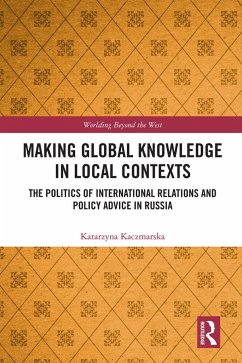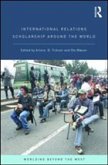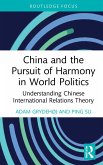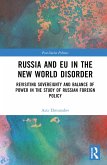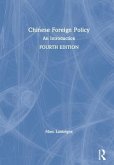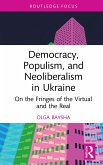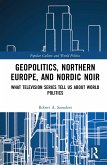"How do we 'know' what we know about international politics? What social, political and institutional forces structure imaginations of the international - of policy practitioners or indeed of academics? This important book - the first detailed analysis of the politics of knowledge about the international in Russia - contributes to the important new literature in the social sciences and International Relations on the politics of knowledge production. Much is at stake: not only our understandings of Russian responses in international politics but also what imaginations of the international more generally 'do' for analysts, states or other interests. Also, crucially, questions of academic freedom and lack thereof, often ignored, are raised to our attention. This study will be an important reference point - and a point of provocation - for all analysts of Russia, International Relations and the Sociology of Knowledge." - Milja Kurki, Aberystwyth University, UK
"If we take seriously the notion that scholarly knowledge is produced in a *local* context, then we have to produce careful studies of how exactly that context shapes the kinds of claims that scholars make and the ways that they evaluate the validity of those claims. Kaczmarska's remarkable book illuminates the conditions under which Soviet, and then Russian, scholars worked, and leads to an expanded appreciation of how social science works in a non-democratic environment." - Patrick Thaddeus Jackson, American University, USA
"The book is a very detailed and comprehensive analysis of the impact of political and institutional context on knowledge production using IR in Russia as a case study. I greatly appreciate the combination of familiarity with the voluminous literature, in-depth engagement with the complex realm of the Russian academia and evidence gathered from fieldwork and interviews. The book should be welcomed by scholars of Russian Studies and Science and Technology Studies." - Vladimir Gel'man, Aleksanteri Institute, University of Helsinki, Finland
"This book is a must for everybody engaging in building an international community in the social science and humanities and in a policy-relevant dialogue across reemerged East-West divide. Katarzyna Kaczmarska demonstrates the contexts in which International Relations and other social sciences in Russia function and their striking difference with a "default" perception of social research as exiting in the West. She gives the floor to a wide variety of voices from Russian academia that demonstrate various approaches and common problems. The book is not only an important addition to the volume of the social studies of IR, but it also brings its readers closer to understanding the limits and pressures experienced by Russian scholars and thus facilitates academic cooperation in this non-academic age."- Ivan Kurilla, Department of Political Sciences, European University at St. Petersburg, Russia
"If we take seriously the notion that scholarly knowledge is produced in a *local* context, then we have to produce careful studies of how exactly that context shapes the kinds of claims that scholars make and the ways that they evaluate the validity of those claims. Kaczmarska's remarkable book illuminates the conditions under which Soviet, and then Russian, scholars worked, and leads to an expanded appreciation of how social science works in a non-democratic environment." - Patrick Thaddeus Jackson, American University, USA
"The book is a very detailed and comprehensive analysis of the impact of political and institutional context on knowledge production using IR in Russia as a case study. I greatly appreciate the combination of familiarity with the voluminous literature, in-depth engagement with the complex realm of the Russian academia and evidence gathered from fieldwork and interviews. The book should be welcomed by scholars of Russian Studies and Science and Technology Studies." - Vladimir Gel'man, Aleksanteri Institute, University of Helsinki, Finland
"This book is a must for everybody engaging in building an international community in the social science and humanities and in a policy-relevant dialogue across reemerged East-West divide. Katarzyna Kaczmarska demonstrates the contexts in which International Relations and other social sciences in Russia function and their striking difference with a "default" perception of social research as exiting in the West. She gives the floor to a wide variety of voices from Russian academia that demonstrate various approaches and common problems. The book is not only an important addition to the volume of the social studies of IR, but it also brings its readers closer to understanding the limits and pressures experienced by Russian scholars and thus facilitates academic cooperation in this non-academic age."- Ivan Kurilla, Department of Political Sciences, European University at St. Petersburg, Russia

